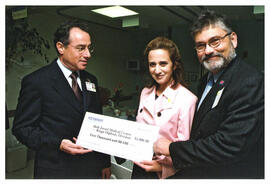The Albert S. Lyons Papers consist primarily of the professional records of Dr. Albert S. Lyons and of the ostomate self-help groups with which he was involved. The collection is organized into nine series. Series 1, Correspondence, contains personal and professional correspondence. Series 2, Writings, contains published and unpublished articles, lectures and reviews. Series 3, Professional Associations, contains the records of Dr. Lyons' involvement in numerous professional organizations, including the American Cancer Society, the American College of Gastroenterology, the Medical Society of the State of New York, the New York Surgical Society, the Society for Surgery of the Alimentary Tract, and the Physicians' Wine Appreciation Society. Series 4, Project Files, contains files on research projects both within and outside the field of medicine, including several surgical and medical projects and a wide range of proposed books. Series 5, Oral History, contains records related to the study and practice of oral history and consists primarily of material from the Oral History Association's annual colloquia. Series 6, History of Medicine, contains records related to Dr. Lyons's work in medical history, including material related to the book Medicine: An Illustrated History and the records of Dr. Lyons's activities as a teacher of medical history at Mount Sinai. Series 7, Subject Files, contains subject files on a wide variety of topics, including material related to the creation of the Mount Sinai Archives and the records of Dr. Lyons's service at a number of New York City hospitals. Series 8, Ostomies & Ostomy Associations, consists of material related to ostomy patient self-help groups and to ostomies in general. It contains an extensive collection of material related to the United Ostomy Association, smaller files of material on local and regional ostomy groups, subject files, and collections of periodicals, vendor publications and miscellaneous literature. Finally, Series 9, Plaques, Slides and Oversized Material, contains oversized and artifactual material including diplomas, professional certificates, presentation slides and honorary plaques.
Lyons, Albert S., 1912-2006Elements area
Taxonomy
Code
Scope note(s)
- The economic aspects of health care, its planning, and delivery. It includes government agencies and organizations in the private sector.
Source note(s)
- Medical Subject Headings
Display note(s)
Hierarchical terms
Health Care Economics and Organizations
Equivalent terms
Health Care Economics and Organizations
- UF Health Care Economics
- UF Health Economics
- UF Healthcare Economics
- UF Healthcare Economics and Organizations



![[?] Arrogo, Beth Israel Medical Center patients' accounts staff member](/uploads/r/arthur-h-aufses-jr-md-archives/5/1/1/511909cef679fd8e2697579e43ebc8547b165a0e446f66b788266d4f4303b0b5/506c6c98-ea31-4680-af90-e3efb37a8333-0064_142.jpg)


